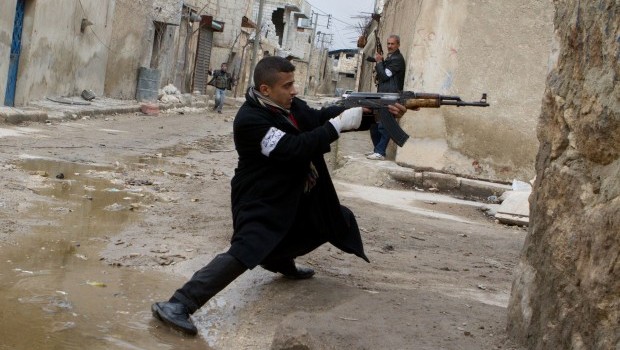
A Syrian rebel aims his weapon during clashes with government forces in the streets near Aleppo international airport in northern Syria on March 4, 2013. Source: AFP PHOTO/STEPHEN J. BOITANO
In the Idlib hills William Hague’s latest words on Syria have brought little good cheer. The British Foreign Secretary has pledged to provide armored vehicles and bullet proof vests to the rebels. But Kanatry, leader of the Omar Al-Mukhter battalion, and one of the key figures in the Syrian military opposition in the Idlib countryside, says that Hague has misunderstood the reality of the fight on the ground. “From the very first day we didn’t wear flak jackets,” he says. “They are heavy and they slow us down. Body armor will not help us win this war.”
Kanatry was one of the first members of the Syrian Army to defect to the opposition, fleeing to the hills of Jebel Al–Zawiya nineteen months ago with a handful of precious guns and bullets. “When I entered the military I swore to protect the country and its people,” he says. “So I knew from the start that I had to stand up for the victims of the regime.”
As Assad’s army escalated its assaults on civilians, a stream of other defectors joined him, and their cache of weapons grew. In those early months their position was precarious. “The regime army was just one kilometer away,” he says. “We found it difficult to sleep because we were always thinking that they could launch an attack at any time.”
But in the past year the Syrian opposition has solidified and strengthened, and Kanatry and his men have slowly cut through the regime–held areas of the Idlib countryside. The Free Syrian Army and its allies now control almost all of the province, bar the city of Idlib itself. “Let Bashar come to the Idlib countryside and walk on the streets here,” Kanatry laughs as he imagines it. “He’d have fun.”
In other areas, too, the rebels are continuing their advance. Four days ago the Free Syrian Army entered Al Raqqa, a key city two hundred kilometres west of Aleppo that had, until now, escaped the fighting that has engulfed other parts of northern Syria. Kanatry agrees that this is an important victory. But he believes that the decisive battle will be in Damascus. “When that battle comes it will be quick,” he says, “because the regime has lost nearly all of its power. They are losing weapons and men, and they have no connection with the people anymore.”
But the regime army still has the advantage of fighter jets, tanks and artillery, and this is the biggest challenge that the rebel fighters face. Kanatry lists the supplies that the opposition really needs to beat the regime and bring the war to an end: ammunition, anti–tank mines, and anti–aircraft guns. Given these, he says, the rebels could topple Bashar Al–Assad’s forces in days. But the non–lethal supplies that William Hague is promising are unlikely to change anything.
Two wars are being fought in Syria—one on the ground inside the country, and the other in the debating chambers outside. There is little connection between the two; Kanatry says that he is in constant communication with the leaders of battalions in Homs and Damascus, but never with members of the Syrian National Council. Their deals with Hague, or their suggestions that there could be negotiations with the regime, are of little concern to the men fighting on the front line, or to the people enduring a savage conflict that is about to enter its third year.
“If we agreed to negotiations with Bashar Al–Assad after all these massacres, would the families of the dead accept it?” asks Kanatry. “Any kind of mediation now would be treachery for all the people of Syria.”
